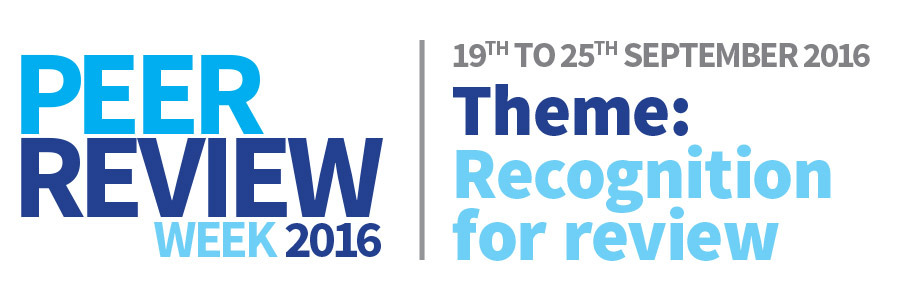Open peer review: What do reviewers think?
| 22 September, 2016 | Ruth Francis |
|

|

It’s the second year of Peer Review Week and in 2016 the theme is Recognition for Review. Our aim in marking the week is to explore the various aspects of how those who spent time on review should be recognised for their contribution.
We believe we go further than many to recognise our reviewers; indeed one of our objectives is to clean up the peer review process and make it more transparent. But enough about us, what do our reviewers think?
We spoke to three recent F1000Research peer reviewers and asked them for their thoughts.
Judith Klein-Seetharaman is a professor at the University of Warwick. Her reviews can be read here and here.
What do you like about open peer review?
I think it is important for a number of reasons. Some reviewers use the anonymous peer review system to delay publication of a competitor’s manuscript. This type of behaviour is prevented in an open system.
Many points reviewers raise are opinion based, and do not necessarily have a strict scientific right or wrong answer. People reading a manuscript will be able to form their own opinions, but consider the opinions of the reviewers.
Sometimes reviews make substantial contributions to a paper, for example in revealing flaws or improving the experimental design or analysis. It is a good idea for the reviewers to obtain credit for it, and also for the authors to know who the reviewers are. The latter may lead to new collaborations.
What is your top tip for other peer reviewers?
Do the same as you would do with an anonymous review – critically assess the manuscript, discuss any points of critique and point out what the positives of the study are.
What more do you think could be done in general to ensure recognition in peer review?This looks like a good start.
Gwilym Lockwood is a PhD Student at the Max Planck Institute for Psycholinguistics. He has a blog here and his F1000Research review can be read here.
What do you like about open peer review?
The transparency and the accountability. Anonymous reviews often encourage people to make unfair and unkind criticisms of a manuscript, which is both unscientific and unpleasant. Open reviews make people think twice about the tone of their comments, and having your name attached to a review generally makes people put in more effort. This is how science should be.
What is your top tip for other peer reviewers?
Only agree to review if you can turn it around quickly. Be thorough. Be kind.
What more do you think could be done in general to ensure recognition in peer review?
It should be part of job and grant application assessments, but it’s hard to say how. I also like F1000Research’s and Collabra’s model where you get reduced or waived APCs as an author in that journal if you’ve done a certain number of reviews for the same journal.
Kevin Black is based in the Washington University Department of Psychiatry. He wrote an Editorial for F1000Research about the launch of our Tics channel that included sections on the advantages of open data and open reviews. His F1000Research review can be read here.
What do you like about open peer review?
Reviewers tend to be more constructive (not to mention nicer) when they know they have to sign their name.
I recently reviewed a paper for a traditional, big-name, medical journal that still focuses on the Paper User Interface. The authors said they selected a particular analysis strategy from the beginning but I was highly skeptical of that claim, as it differed from their approach to the rest of the analysis. Their reply gave an explanation but I was still skeptical. I didn’t think this issue had to prevent publication of the manuscript, but it was important. An exchange like this would be very valuable for the paper’s readers to see, to help them evaluate the paper’s merits, but this exchange will probably never see the light of day. The point is, open peer review includes careful feedback from the authors’ peers that can enhance the overall value of the publication—it’s a shame to throw it away.
What is your top tip for other peer reviewers?
Do as you would be done by — assuming that you will be honest about the paper’s flaws and strengths.
What more do you think could be done in general to ensure recognition in peer review?
Get big-name journals to renounce policies that assert ownership over the reviews, and unambiguously acknowledge that reviewers have copyright in their review.

|

